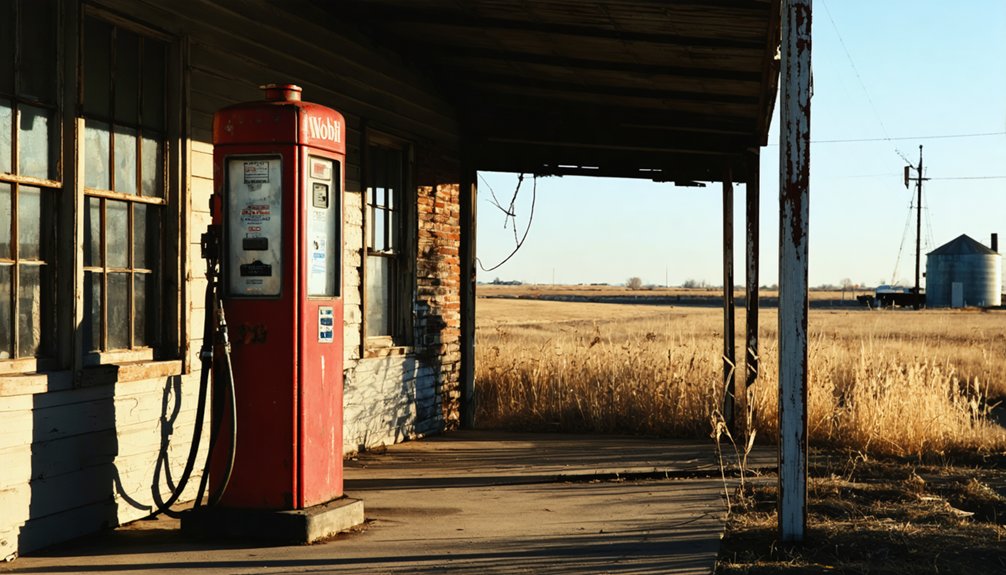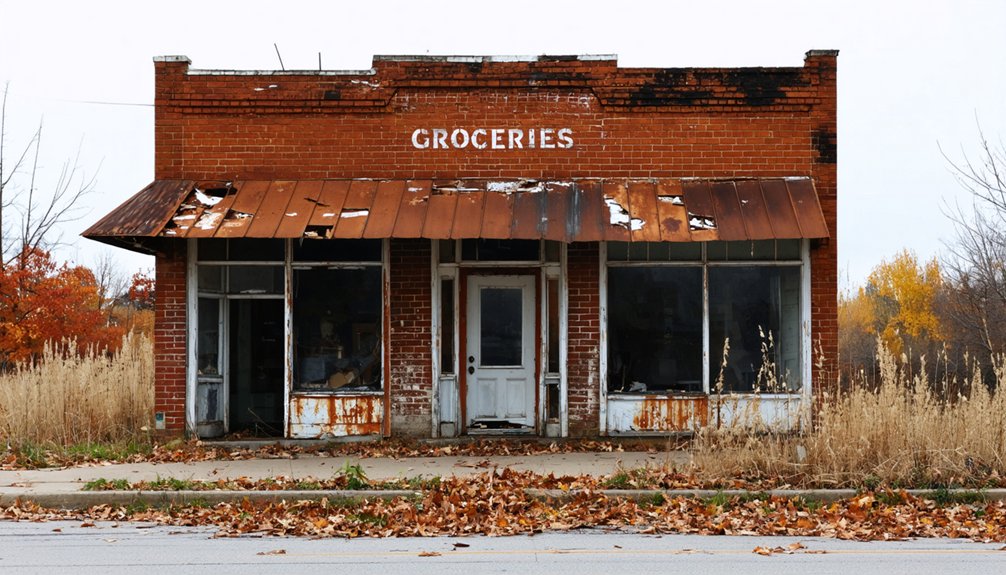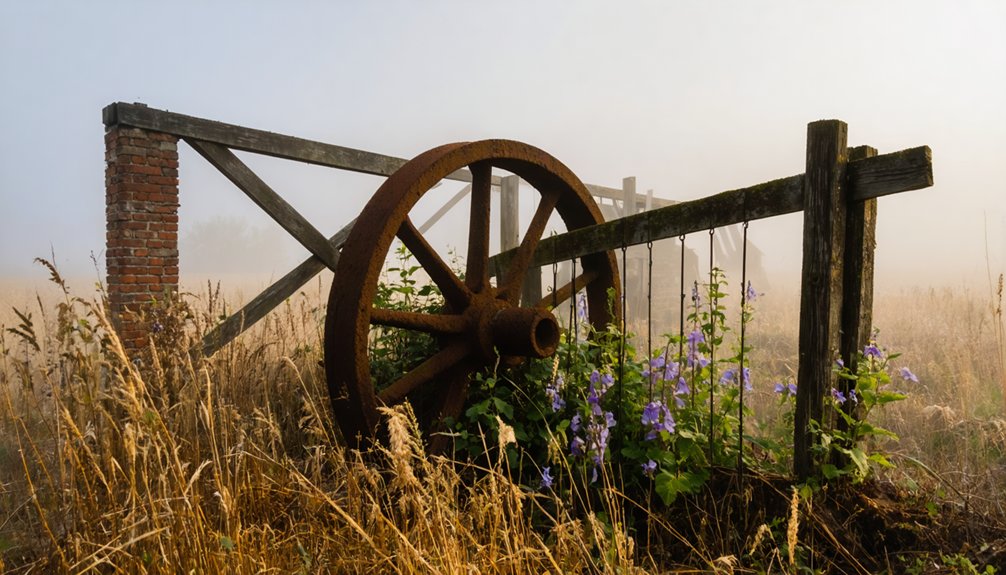You’ll discover Motor, Iowa’s poignant story through its towering 90-foot limestone mill, built in 1869 along the Turkey River. While John Thompson’s vision of a prosperous milling community lasted only briefly, the five historic limestone buildings still stand as silent sentinels of pioneer ambition. Crop failures, chinch bug infestations, and the devastating 1883 flood ended the town’s dreams, but today’s preserved site offers a window into Iowa’s pioneering spirit.
Key Takeaways
- Founded in 1869 with $90,000, Motor was built around a six-story gristmill but declined after agricultural disasters and economic challenges.
- The 1883 flood destroyed the mill’s dam and marked the end of Motor’s industrial operations, contributing to the town’s abandonment.
- The Klink family purchased and converted the settlement to farmland in 1903, effectively ending Motor’s existence as a town.
- Five limestone buildings remain: the 90-foot mill, cooperage, inn, icehouse, and sawmill, now preserved as historic structures.
- The Clayton County Conservation Board acquired the ghost town site in 1983, preserving it for historical education and tourism.
The Rise and Fall of a Milling Town
Along the banks of the Turkey River, a dream of industrial prosperity took shape in 1869 when three ambitious entrepreneurs – John Thompson, James Crosby, and J.P. Dickinson pooled $90,000 to establish Motor, Iowa.
You’ll find their vision embodied in the towering six-story gristmill, masterfully crafted by German stonemasons using local stone transported by innovative cable cars.
The mill’s milling innovations transformed the region’s grain into premium flour, processing up to 1,500 bushels weekly.
Yet the community dynamics shifted dramatically as wheat crops failed and chinch bug invasions devastated harvests.
Nature’s cruel hand struck Motor’s ambitions, as failing wheat crops and destructive chinch bugs brought the community to its knees.
Despite producing some of the region’s finest baking flour, the mill’s fate was sealed when an 1883 flood destroyed its dam.
The Klink family ownership of the property continued for eight decades after Louis Klink’s purchase in 1903.
In 1977, the historic structure gained recognition when it was listed on the National Register of Historic Places.
Architectural Heritage: The Six-Story Limestone Mill
Limestone greatness rises from the Turkey River valley in the form of Motor Mill, a commanding six-story tribute to 19th-century industrial architecture.
Standing 90 feet tall, this marvel of stone craftsmanship features walls five feet thick, quarried from the bluff above using an ingenious cable car system designed by James Crosby.
The mill, which was built in the 1860s, now stands as a testament to the region’s ambitious past.
You’ll find exceptional architectural aesthetics throughout the 45′ x 60′ structure, where German stonemasons left their mark through intricate stonework that’s both beautiful and enduring.
The mill’s design strikes a perfect balance between industrial utility and artistic grace.
Along with four additional limestone buildings – including a cooperage, inn, icehouse, and sawmill – you’re witnessing more than just a mill; you’re experiencing a masterpiece of American industrial heritage that’s stood proudly since 1869.
At its peak, the mill was a powerhouse of productivity, processing an impressive 1500 bushels of wheat each week.
Natural Wonders Along the Turkey River
Along the Turkey River’s wooded banks, you’ll discover a vibrant display of spring wildflowers carpeting the forest floor, from delicate trilliums to clusters of wild geraniums.
You can spot bald eagles soaring above the limestone bluffs, while white-tailed deer and wild turkeys rustle through the underbrush, creating a living connection to Motor’s wilderness past. The 98-mile water trail winds through this pristine landscape, offering paddlers intimate views of the region’s diverse wildlife. Popular 2-hour paddling trips take adventurers from Turkey River Park to Motor Mill through this scenic corridor.
The well-worn riverside trails, once used by mill workers, now offer quiet paths where you can experience the same natural beauty that drew settlers to this remote valley nearly two centuries ago.
Seasonal Wildflower Displays
Throughout the changing seasons, the Turkey River near Motor graces visitors with an enchanting parade of native wildflowers that have persisted since pioneer times.
You’ll spot delicate pasque flowers emerging first, followed by great waterleaf’s showy blooms attracting early pollinators. In richer soil pockets, blue cohosh quietly flowers before producing berries, while hardy lyre-leaved rock cress clings to nutrient-poor cliff faces. Lora Conrad documented woodland wildflower species here while contributing to seasonal observations.
As spring yields to summer, you’ll witness white wild indigo‘s opalescent petals shimmer in changing light, and coralberry shrubs develop their distinctive red drupes. The undisturbed herbaceous layers help naturally defend against invasive plant species taking hold.
This seasonal bloom progression supports diverse pollinator communities across woodland and prairie habitats. The 250-foot bluffs create unique microclimates, ensuring wildflower diversity thrives in distinct zones from riverbank to cliff top, offering you an untamed botanical sanctuary to explore.
Turkey River Wildlife Watching
The Turkey River’s vibrant ecosystem beckons wildlife enthusiasts with its rich diversity of creatures, from the depths of its flowing waters to the soaring heights of its limestone bluffs.
You’ll discover prime wildlife photography spots along the 98-mile water trail, where 74 fish species thrive beneath the surface and nearly 100 bald eagle nests dot the valley’s canopy.
For the best birdwatching tips, focus on the wetland dikes during dawn hours, when marsh wrens and yellow-headed blackbirds emerge from their hiding spots.
Keep your camera ready as river otters play along the banks, and bobcats prowl through oak-hickory woodlands.
Anglers can catch smallmouth and rock bass while exploring the pristine waters that flow past limestone outcrops.
The limestone outcrops offer perfect vantage points to capture great blue herons fishing in the shallows or osprey soaring on summer thermals above Motor’s forgotten shores.
Riverside Hiking Trails
Majestic limestone bluffs and wooded hillsides frame an extensive network of hiking trails that wind through Motor’s historic river valley.
The area features native white pines growing dramatically from ancient limestone outcroppings.
You’ll discover riverside trails stretching from Gouldsburg Park to the Mississippi River, offering diverse hiking experiences through mixed hardwood forests and rolling plains.
Along these paths, you’re free to explore dramatic geological formations and seasonal foliage changes while connecting with the region’s natural heritage.
You’ll find well-marked trailheads at Gilbertson Nature Center, Valley Bridge, and Turkey River Park, where convenient amenities like restrooms and picnic areas support your adventure.
The paved sections between Elgin and Clermont provide easy hiking, while natural surface trails offer more rugged options.
Keep watch for historic landmarks, including the Keystone Bridge and early settlement remnants that dot the landscape.
Agricultural Legacy and Economic Challenges
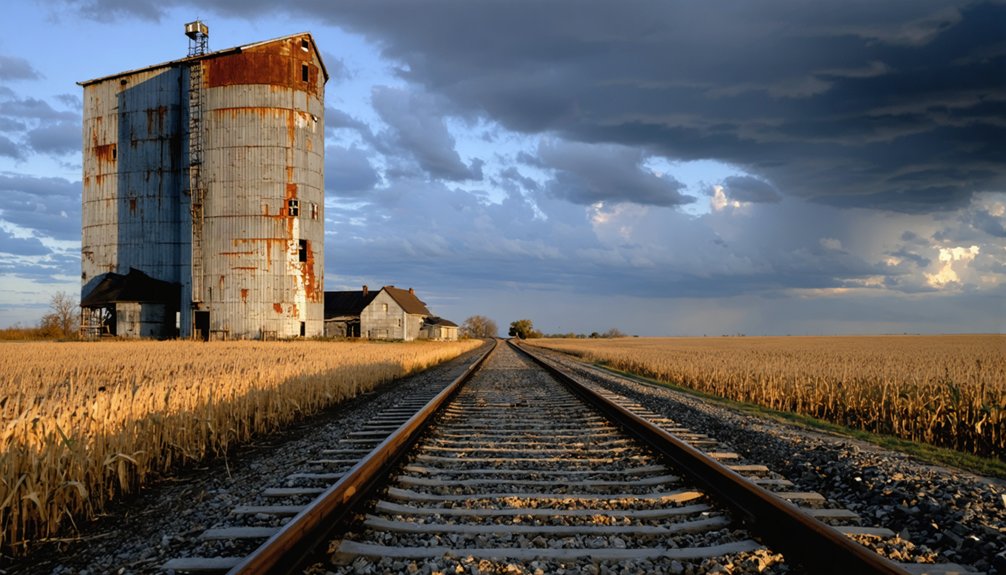
As you study Motor’s agricultural history, you’ll find that wheat farming once promised prosperity before devastating crop failures in the late 1800s undermined the town’s future.
The pioneers who established farms along the Turkey River faced constant challenges, from the destructive chinch bug invasion of 1871 to the harsh realities of manual labor in an era before modern farming equipment.
The limestone grist mill, which had processed over 700 barrels of flour by 1876, stands as a silent reminder of Motor’s brief agricultural golden age and its subsequent economic collapse.
Wheat Crop Failure Impact
While dreams of agricultural prosperity initially drew settlers to Motor, devastating crop failures would ultimately seal the town’s fate.
You can trace Motor’s downfall to the relentless chinch bug infestations that decimated the wheat fields soon after the mill’s 1870 opening. As wheat resilience strategies failed, farmers had no choice but to abandon their traditional grain production, turning instead to crop diversification practices like corn cultivation and livestock raising.
The agricultural upheaval proved catastrophic for the $90,000 mill investment. Without a steady supply of wheat, the mill’s operations became unsustainable.
The final blow came with the destructive 1883 flood that damaged the dam beyond repair. By 1891, what was once a promising venture fell under the auctioneer’s hammer, marking the end of Motor’s brief but poignant chapter.
Pioneer Farming Struggles
Beyond the traditional wheat fields, Motor’s pioneer farmers faced daily struggles that tested their resilience and ingenuity. You’d have found them battling chinch bug infestations while desperately shifting from wheat to more resilient crops like corn, oats, and rye.
Their crop diversification efforts weren’t just about survival – they were about breaking free from the constraints of a single-crop economy.
The Turkey River, while providing essential power for the mill, also brought destructive floods that threatened their livelihood.
Despite these challenges, you would’ve witnessed these determined settlers adapting their pest management strategies and making the most of the region’s unique geography. They worked the fertile floodplains for crops while utilizing the rocky ridges’ old-growth white oak, proving that freedom often comes through versatility and determination.
Mill’s Economic Downfall
The proud Motor Mill’s tale of economic decline began in the same fields where pioneer farmers had fought their battles.
You can trace the downfall through three devastating blows that crippled their economic strategies:
- Chinch bug infestations destroyed local wheat crops, leaving the mill machinery idle and starving for raw materials.
- Farmers abandoned wheat production for corn and livestock, transforming the agricultural landscape you’d once known.
- Railroad expansion allowed crops to bypass local mills entirely, spelling doom for Motor’s traditional milling economy.
The mill’s operators tried desperately to adapt, but nature and progress proved relentless.
By 1883, a devastating flood destroyed the dam, and repairs were deemed impossible.
You wouldn’t see the mill grind another bushel of grain – it stood silent, a symbol of changing times and broken dreams.
Preservation Efforts Through the Years
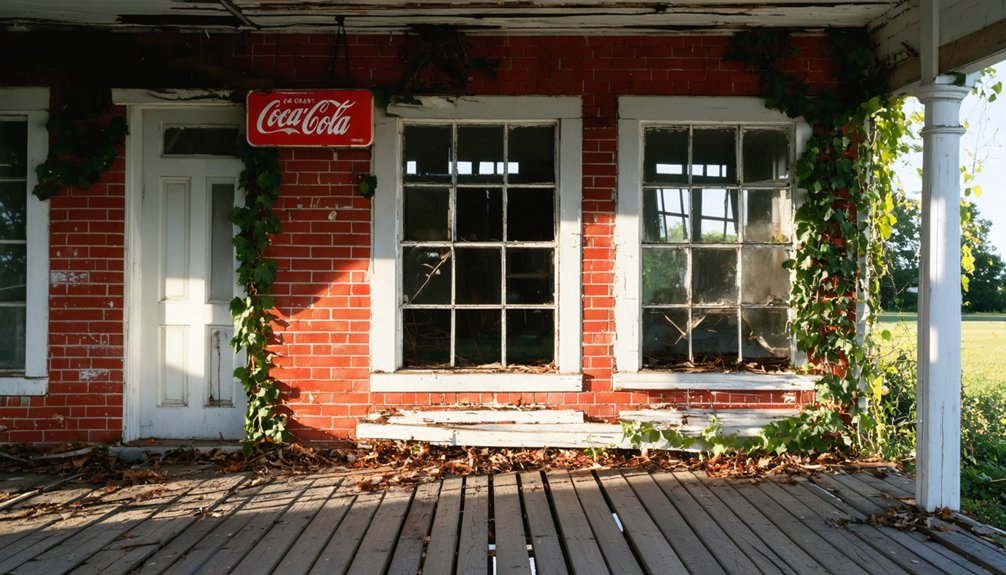
Since its decline as a bustling mill town, Motor’s preservation journey has transformed through several dedicated organizations and countless volunteer hours.
In 1983, you’ll find the turning point when the Clayton County Conservation Board purchased the 100-acre site, marking the first major step in saving this historic treasure from deterioration.
The preservation challenges intensified after floods and environmental impacts, but community involvement never wavered.
You’ll see the Motor Mill Foundation’s dedication shine through their 2007 Long Range Plan, which sparked major restorations of floor joists, roofing, and windows.
They’ve even reconstructed the iconic pin-and-truss bridge in 2012.
Today, you can experience Motor’s rich history through bi-monthly tours and living history events, keeping the spirit of this remarkable site alive.
From Bustling Settlement to Historic Site
Nestled along the Turkey River in Clayton County, Motor emerged as a promising settlement in 1869 with the construction of its magnificent six-story limestone grist mill.
The town’s historical significance grew as community resilience shaped its development, adding a school, tavern, and stables to support the bustling mill operations.
Yet Motor’s story would take dramatic turns:
Life in Motor twisted and turned like the Turkey River that flowed past its limestone walls.
- Economic challenges, including wheat crop failures and partnership disputes, led to the town’s initial decline.
- The Klink family’s 1903 purchase transformed the settlement into agricultural land, preserving the structures while changing their purpose.
- By 1983, the Clayton County Conservation Board recognized Motor’s unique heritage, acquiring the site and launching preservation efforts.
Today, you’ll find this treasured ghost town listed on the National Register of Historic Places, beckoning visitors to explore its rich past.
Exploring Motor Mill Historic District Today
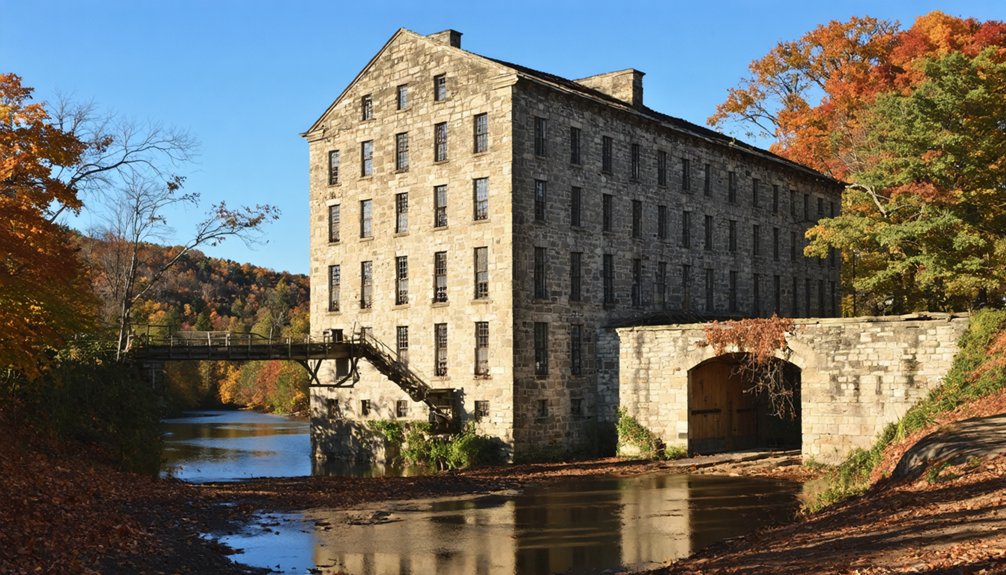
Modern-day visitors to Motor Mill Historic District discover a meticulously preserved slice of Iowa’s industrial heritage, where limestone buildings stand proudly against time’s relentless march.
You’ll find yourself stepping back in history as volunteer guides share ghost stories and local lore while leading you through the towering six-story mill and four surviving outbuildings.
You’re free to craft your own visitor experience here. Paddle the Turkey River‘s peaceful waters, trek more than four miles of trails through diverse ecosystems, or spend a night in the historic Motor Mill Inn.
Whether you’re exploring blufftop overlooks, photographing architectural details, or camping under starlit skies, you’ll connect deeply with this remote sanctuary where nature and nineteenth-century ambitions intertwine.
Frequently Asked Questions
Are There Any Ghost Stories or Paranormal Activities Reported at Motor Mill?
You’ll find no documented ghost sightings or paranormal investigations at Motor Mill. While whispers of local folklore may dance through the limestone walls, the site’s true magic lies in its historical preservation.
What Happened to the Original Residents After They Left Motor?
You’ll find the original residents followed common migration patterns, moving to larger cities for better opportunities, though their community memories lived on through descendants who settled across Iowa and beyond.
Can Visitors Stay Overnight in Any of the Restored Buildings?
Ever dreamed of sleeping in history? You can book overnight accommodations at the beautifully restored Motor Mill Inn, which welcomes up to 12 guests across its upper floors with modern amenities and historic charm.
What Kinds of Fish Can Be Caught in the Turkey River Today?
You’ll find diverse fishing opportunities in the Turkey River, where smallmouth bass, walleye, catfish, northern pike, and stocked rainbow trout thrive in the river’s rich ecological system.
Is Metal Detecting or Artifact Collecting Allowed on the Historic Grounds?
While you might wish to explore freely, you can’t metal detect or collect artifacts here without permits. Since Motor’s on public land, federal metal detecting regulations and artifact preservation policies strictly protect these historic grounds.
References
- https://motormill.org/history/historical-timeline/
- https://www.bleedingheartland.com/2022/09/21/iowa-wildflower-wednesday-motor-mills-micro-beauty/
- https://reformedjournal.com/2019/07/05/ghost-town-legacy/
- https://www.crawfordcounty.iowa.gov/about/forgotten_towns/
- https://www.discoverguthriecounty.org/ghosttowns
- https://geotourist.com/tours/527/The_Archaeological_Guide_to_Iowa/point/2153/The_Ruins_of_Motor_Town
- https://en.wikipedia.org/wiki/List_of_ghost_towns_in_Iowa
- https://en.wikipedia.org/wiki/Motor_Mill_Historic_District
- https://turkeyriver.org/recreation/motor-mill/
- https://motormill.org/history/
